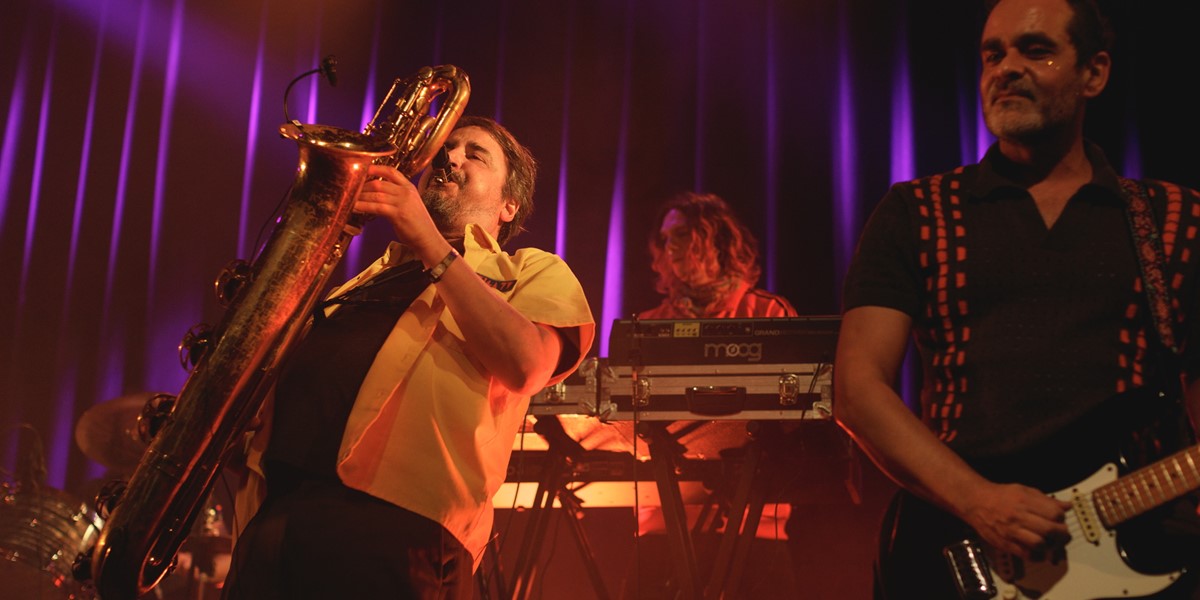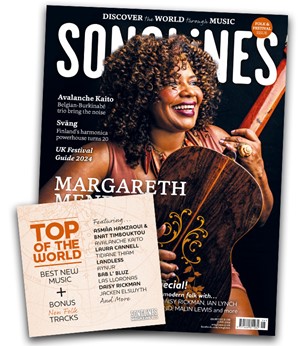Thursday, January 11, 2024
Oslo World 2023
Martin Longley witnessed Mari Boine, Bixiga 70, Gaye Su Akyol and Les Mamans de Congo at the 30th anniversary of this exceptional city-spanning festival…

© Darja Olsevskaja
Oslo World takes over its titular city for eight days (September 30 - November 1, 2023); here are a few highlights from the first few days of the festival.
The opening took place at the Konserthus and involved the intimate sound of veteran Sámi singer Mari Boine and mostly jazz pianist Bugge Wesseltoft, preceded by the heartily outgoing dance-and-song ensemble choreographed by Elle Sofie Sara. Her Vástádus Eana meshed joik voicings with ambulatory ritual, the group later returning for the show’s climax. This was just as well, because Boine’s lone vocals, early in the set, weren’t particularly distinctive or engaging, and Wesseltoft’s piano shapes were quite diaphanous. This was intended, of course, but when guest singer Ella Marie Hætta Isaksen entered, this immediately created a more lively dynamic, freeing Boine up to be more adventurous, but also more traditional in style. The interchange between the two worked well, and was further enlivened by the chorus of Sara’s singer-dancers.
Les Mamans de Congo appeared at Cosmopolite on the festival’s second evening, joined by deejay Rrobin, who adopted a much lower profile on the live stage. It was the singing and dancing Mamans collective who unavoidably dominated the show, combining their roles in a way that made their performance look like part of a Broadway show, as they proceeded to dismantle their own stage-props, turning them into street-trash, in ironic mockery of the way Congolese life might be viewed by Europeans.
Kafé Hærverk seems to be one of Oslo’s most loved alternative venues, small and funky, and highly intimate when compared to Cosmopolite. Singer and oud player Nawar Alnaddaf is now local, but originally hails from Syria, leading a small band that she’s assembled to prioritise a relaxed cohesion. It’s solo voice and oud at first, but the violin, toned-down electric guitar, upright bass and drums steadily seep inside the frame. The instrumental combination is just right, providing wide tonal differences in an enclosed format. Alnaddaf picks up a small harp-like instrument that looks like an Ethiopian kraar, with its splayed strings, played solo at first, before the band trots in at a horse-pace canter. Circular figures cut to a completely solo violin solo, and then Alnaddaf chooses an end-blown flute for the next tune, soft and trilled in turn, backed by a bowed bass drone. This quartet continues to provoke interest via regular switching of tools. Abandonment is calling, and towards the end Alnaddaf becomes a lead singer, seemingly entering the popular Norwegian folk song arena, given that the huddled audience is mostly singing along. Such grainy perimeters are increasingly becoming the norm, on a modern mission to confound ethnomusicologists.
On the third night I wanted to see three shows, all at different venues, but thankfully they all sat along the same tram line, so it was easy to jump, one-two-three from Mira Thiruchelvam, then Bixiga 70 and finally Gaye Su Akyol.
That first artist may not be familiar to many folks outside of Norway. Mira Thiruchelvam came across from Bergen, along with the Vestnorsk Jazz Ensemble, who specialise in realising the works of featured composers. Here, they drew a full crowd at the Victoria Nasjonal Jazzscene, one of Oslo’s most famed clubs. Multi-instrumentalist Thiruchelvam’s roots are Sri Lankan, manifested in the particular blend of her music, naturally infusing aspects of folk, jazz, rock, electronic and Carnatic classical. All sounds are made equal, realised by a diverse band membership, clearly arriving from different stylistic scenes. There are three keyboards, flute, saxophone, oud, guitar, bass and percussion, the latter leading a heavy march at the outset. Various vocals add to the palette, growing with violin, tabla and Carnatic-style double-headed miruthangam. By the third section, we have an Indo-jazz aura, led by harmonium, as musical director Kjetil Møster solos on tenor saxophone, guitar leading a jittery-time riff, the ensemble now creating their biggest brew of a number.
As your scribe jumps off the tram at Parkteatret, the Brazilian super-funk posse Bixiga 70 are almost approaching full heat, as he wriggles in at the side of the stage-front, standing-only space down here at the front. There’s a dynamic between the charismatic band-core of guitarist Cristiano Scabello, always stoking an angular groove, and the forceful horn section, who specialise in the lowest ends of trombone, tenor and baritone saxophones. There’s also the extremely retro Moog solos of Pedro Regada, liberally spiralling through the newer numbers (for newer members). Bixiga 70 are best experienced live, at very close proximity!
Further up the tram-hill lies Cosmopolite, another largely standing-up joint, where Gaye Su Akyol is deep inside the Anatolian garage rock pulse, revealing her new dashing buccaneer look. There are no radical departures since early ‘23, with the band still stripped down to a trio, guitar and bass united within one player, Akyol leading in song and speech, strengthening both sides. The band remains powerful, but they also benefit from a casting-far aura of comment, grim-smile cynicism and campaigning optimism in the face of The Man, and his wars or general fascistic oppression. Rockin’ with a message.


